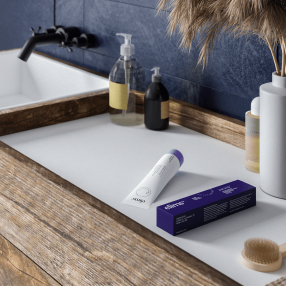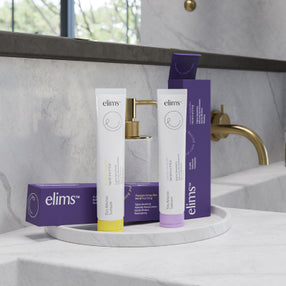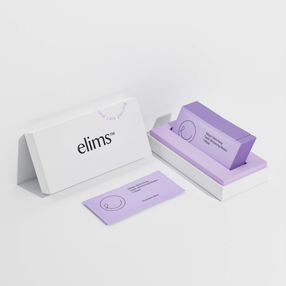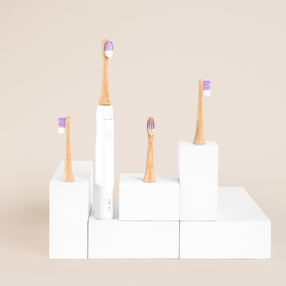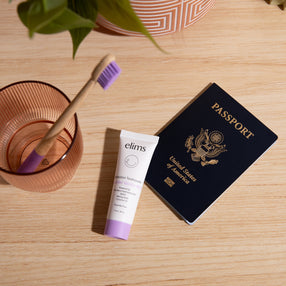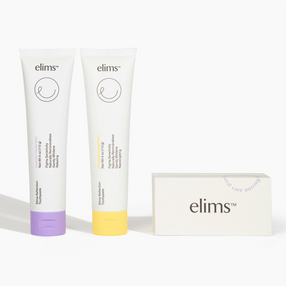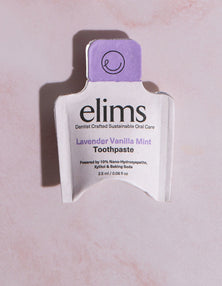
What Are The Best Treatments For Sensitive Teeth?
What Are The Best Treatments For Sensitive Teeth?
Living with sensitive teeth can be incredibly frustrating. That sudden jolt of pain that comes from eating or drinking hot and cold food is incredibly common, with estimates suggesting that one in every eight adults experience some level of sensitivity.
Just know: It's okay to be sensitive! And here’s the good news: that pain and sensitivity can be reduced, and there is a ton of treatments available that you can use. We have taken a closer look at some of the best treatments as well as methods of prevention to reduce the risk of developing tooth sensitivity.
What causes tooth sensitivity?
Before looking at the treatments and prevention techniques, it is important to understand what causes it. There are a few causes, but typically it is due to the nerve in the tooth sensing something hot or cold. However, tooth sensitivity can also be related to eating sweet foods, carbohydrates, or acidic food.
This sensation will be triggered either by direct contact with the nerve or through messages that are relayed back to the nerve through dentinal tubules. These are present in the dentin and cementum of the tooth, which is also what the root is made of.
Tooth sensitivity is not usually caused by an exposed nerve, although a broken tooth or huge cavity can result in sensitivity. Instead, it is most commonly caused when the dentin or cementum within the tooth is exposed through the erosion of the outer enamel. This erosion can occur naturally over time and through demineralization, but eating and drinking acidic food and sugary drinks can accelerate this process significantly. When we eat these foods, the bacteria in our mouth feed off it, which releases the acid that causes erosion of the enamel and dentin.
Experiencing sensitivity is also more common in older people. As we age, our gums recede further, and our roots are more exposed. Having a major filling can also result in sensitivity as temperatures transmit through the restoration. While sensitivity can be painful when you eat and drink if left unchecked or treated, it can result in the nerve going bad.
How can you prevent tooth sensitivity?
The best method of stopping tooth sensitivity is prevention, although experiencing some sensitivity is unavoidable. Luckily there are a things you can do at home to help avoid sensitivity. Ensuring you are regularly brushing and flossing your teeth will help to keep the level of bacteria down and prevent decay and acid from being released. You should also try to avoid eating those acidic foods and drinks.
If you are beginning to notice that your tooth is becoming more sensitive, then you should visit your dentist to ensure that it is not a sign of tooth decay or excessive wear. If your dentist notices either of these, then they may recommend further treatment.
What are the most effective treatments for sensitive teeth?
Having sensitive teeth can be a real bummer, and may result in you having to avoid foods and drinks you love. Thankfully, there are various treatments that can reduce the symptoms. If the sensitivity is only minor, then it can be possible to treat the cause without the need to visit a dentist. There are various products available that help to desensitize your teeth while also helping to remineralize them. Users can utilize calcium phosphate products which are derived from milk and dairy, while there is also toothpaste that contains fluoride to help to strengthen your teeth. In some cases, your dentist might also prescribe special toothpaste which is higher in fluoride.
If the sensitivity is caused by a deep filling, then your dentist might suggest removing the filling and placing a liner below it to prevent the temperature transfer. However, not all dentists recommend this as it can result in the filling becoming weaker. In the worst case scenario, the dentist might need to treat the nerve directly in order to remove the sensitivity.
Looking for a natural alternative?
If you are looking to protect your teeth and help to reduce the sensitivity from food and drink, but want a natural solution, then Elims is here to help you.
We know how much tooth sensitivity can impact your day-to-day life. That is why our toothpaste contains nano-hydroxyapatite. This closely mimics hydroxyapatite, a natural mineral that is already found in your teeth and is completely safe for regular usage. It has been clinically proven that at the right formulations, nanohydroxyapatite can help to remineralize your teeth.
Using nano-hydroxyapatite is also a great alternative to using fluoridated toothpaste, which is one of the most popular trends at the moment. Our toothpaste also contains no milk products, which means it is a suitable option for those who might be sensitive to dairy or looking for a vegan toothpaste.
If you want to find out more about our Elims products, you can check out the full range here, or you can check out some of the most commonly asked questions here.
What Are The Best Treatments For Sensitive Teeth?
Living with sensitive teeth can be incredibly frustrating. That sudden jolt of pain that comes from eating or drinking hot and cold food is incredibly common, with estimates suggesting that one in every eight adults experience some level of sensitivity.
Just know: It's okay to be sensitive! And here’s the good news: that pain and sensitivity can be reduced, and there is a ton of treatments available that you can use. We have taken a closer look at some of the best treatments as well as methods of prevention to reduce the risk of developing tooth sensitivity.
What causes tooth sensitivity?
Before looking at the treatments and prevention techniques, it is important to understand what causes it. There are a few causes, but typically it is due to the nerve in the tooth sensing something hot or cold. However, tooth sensitivity can also be related to eating sweet foods, carbohydrates, or acidic food.
This sensation will be triggered either by direct contact with the nerve or through messages that are relayed back to the nerve through dentinal tubules. These are present in the dentin and cementum of the tooth, which is also what the root is made of.
Tooth sensitivity is not usually caused by an exposed nerve, although a broken tooth or huge cavity can result in sensitivity. Instead, it is most commonly caused when the dentin or cementum within the tooth is exposed through the erosion of the outer enamel. This erosion can occur naturally over time and through demineralization, but eating and drinking acidic food and sugary drinks can accelerate this process significantly. When we eat these foods, the bacteria in our mouth feed off it, which releases the acid that causes erosion of the enamel and dentin.
Experiencing sensitivity is also more common in older people. As we age, our gums recede further, and our roots are more exposed. Having a major filling can also result in sensitivity as temperatures transmit through the restoration. While sensitivity can be painful when you eat and drink if left unchecked or treated, it can result in the nerve going bad.
How can you prevent tooth sensitivity?
The best method of stopping tooth sensitivity is prevention, although experiencing some sensitivity is unavoidable. Luckily there are a things you can do at home to help avoid sensitivity. Ensuring you are regularly brushing and flossing your teeth will help to keep the level of bacteria down and prevent decay and acid from being released. You should also try to avoid eating those acidic foods and drinks.
If you are beginning to notice that your tooth is becoming more sensitive, then you should visit your dentist to ensure that it is not a sign of tooth decay or excessive wear. If your dentist notices either of these, then they may recommend further treatment.
What are the most effective treatments for sensitive teeth?
Having sensitive teeth can be a real bummer, and may result in you having to avoid foods and drinks you love. Thankfully, there are various treatments that can reduce the symptoms. If the sensitivity is only minor, then it can be possible to treat the cause without the need to visit a dentist. There are various products available that help to desensitize your teeth while also helping to remineralize them. Users can utilize calcium phosphate products which are derived from milk and dairy, while there is also toothpaste that contains fluoride to help to strengthen your teeth. In some cases, your dentist might also prescribe special toothpaste which is higher in fluoride.
If the sensitivity is caused by a deep filling, then your dentist might suggest removing the filling and placing a liner below it to prevent the temperature transfer. However, not all dentists recommend this as it can result in the filling becoming weaker. In the worst case scenario, the dentist might need to treat the nerve directly in order to remove the sensitivity.
Looking for a natural alternative?
If you are looking to protect your teeth and help to reduce the sensitivity from food and drink, but want a natural solution, then Elims is here to help you.
We know how much tooth sensitivity can impact your day-to-day life. That is why our toothpaste contains nano-hydroxyapatite. This closely mimics hydroxyapatite, a natural mineral that is already found in your teeth and is completely safe for regular usage. It has been clinically proven that at the right formulations, nanohydroxyapatite can help to remineralize your teeth.
Using nano-hydroxyapatite is also a great alternative to using fluoridated toothpaste, which is one of the most popular trends at the moment. Our toothpaste also contains no milk products, which means it is a suitable option for those who might be sensitive to dairy or looking for a vegan toothpaste.
If you want to find out more about our Elims products, you can check out the full range here, or you can check out some of the most commonly asked questions here.
